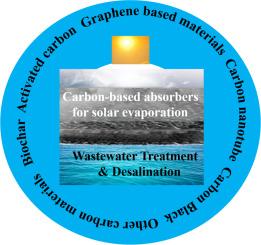Advances in carbon-based materials for solar-driven steam generation, desalination and water treatment
IF 9.8
1区 工程技术
Q1 ENGINEERING, CHEMICAL
引用次数: 0
Abstract
As water scarcity escalates globally, recycling and reusing water resources is crucial for ensuring sustainable access to clean water. Photothermal technology for seawater desalination and wastewater treatment applications is promising towards solving the demand for clean water. This review explores the innovative use of carbon-based sunlight absorbers for solar-driven steam generation, a key method for desalinating seawater and treating wastewater. Turning waste into wonder carbon absorbers materials could help solve the globe's escalating water crisis and thus, the exploration for valorizing waste resources including agricultural, food, paper, textile and plastic wastes to derive such absorbers sustainably were carefully reviewed. This review surveys recent advancements in engineering carbon-based materials from waste streams for photothermal water treatment, analyzing the interplay between composition, morphology, and performance. It also addresses the current limitations and suggests potential improvements. Solar evaporation systems have demonstrated feasibility but require optimization of absorbers morphology, chemical make-up and system integration to become viable for practical large-scale implementation. Furthermore, this review emphasizes the need for continued research and development to address existing challenges, underscoring the significance of this technology in providing a sustainable solution to the increasing global demand for clean water.

用于太阳能蒸汽发电、海水淡化和水处理的碳基材料研究进展
随着全球缺水问题的加剧,水资源的循环和再利用对于确保可持续获得清洁水至关重要。用于海水淡化和废水处理的光热技术在解决清洁水需求方面大有可为。本综述探讨了碳基阳光吸收剂在太阳能驱动蒸汽发电中的创新应用,这是海水淡化和废水处理的一种关键方法。将废弃物转化为神奇的碳吸收材料有助于解决全球不断升级的水危机,因此,本综述对如何利用农业、食品、造纸、纺织和塑料废弃物等废弃物资源,以可持续的方式获得此类吸收材料进行了仔细研究。本综述调查了从废物流中提取碳基材料用于光热水处理的最新进展,分析了成分、形态和性能之间的相互作用。它还探讨了当前的局限性,并提出了潜在的改进建议。太阳能蒸发系统已经证明了其可行性,但还需要对吸收器的形态、化学成分和系统集成进行优化,才能实现大规模的实际应用。此外,本综述还强调了继续研究和开发以应对现有挑战的必要性,同时强调了该技术在为全球日益增长的清洁水需求提供可持续解决方案方面的重要意义。
本文章由计算机程序翻译,如有差异,请以英文原文为准。
求助全文
约1分钟内获得全文
求助全文
来源期刊

Desalination
工程技术-工程:化工
CiteScore
14.60
自引率
20.20%
发文量
619
审稿时长
41 days
期刊介绍:
Desalination is a scholarly journal that focuses on the field of desalination materials, processes, and associated technologies. It encompasses a wide range of disciplines and aims to publish exceptional papers in this area.
The journal invites submissions that explicitly revolve around water desalting and its applications to various sources such as seawater, groundwater, and wastewater. It particularly encourages research on diverse desalination methods including thermal, membrane, sorption, and hybrid processes.
By providing a platform for innovative studies, Desalination aims to advance the understanding and development of desalination technologies, promoting sustainable solutions for water scarcity challenges.
 求助内容:
求助内容: 应助结果提醒方式:
应助结果提醒方式:


